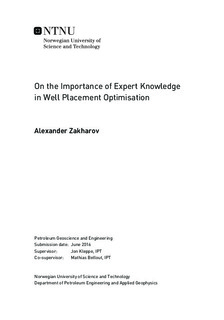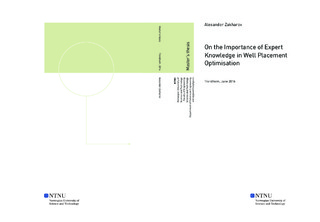| dc.description.abstract | As of today, well placement optimisation in field development planning is most commonly based on the trial-and-error approach that requires the evaluation of numerous field development scenarios. This approach is not particularly efficient because it requires a lot of repetitive work to be done by reservoir engineers. Moreover, such approach can lead to overlooked opportunities and suboptimal well placement, which, in turn, can have a negative economic impact on a project in the long-term perspective.
This work describes an effort to better understand the role of reservoir engineering expert knowledge in well placement optimisation at the stage of field development planning and figure out whether an appropriate choice of optimiser parameters can help reduce the dependence on experience-based knowledge. The research question is thus formulated as:
What is the role of expert knowledge in the process of well placement optimisation, and how to reduce the dependence on such knowledge?
An experimental approach is taken. Numerical experiments are conducted on a two-dimensional reservoir model to understand how the quality of initial approximation and two main optimiser parameters affect the optimisation results.
A purpose-specific optimiser-simulator interface is developed to integrate the HOPSPACK optimiser with the ECLIPSE reservoir simulator.
The interpretation of numerical experiments leads to the following two major conclusions for this particular two-dimensional optimisation problem:
Reservoir engineering expert knowledge plays an important role in the process of well placement optimisation by providing a good quality initial approximation;
A proper choice of the optimiser parameters that allow for a wide exploration of the search space may significantly reduce the dependence on such expert knowledge.
It is demonstrated that for the relatively simple reservoir model considered in this study, optimisation techniques can enhance the well placement optimisation workflow. Further research focused on more complex three-dimensional reservoir models may contribute to dispelling the general scepticism towards the use of optimisation techniques for real life situations. | |

